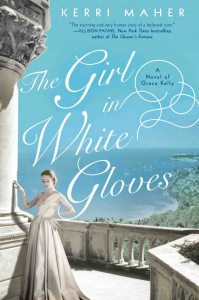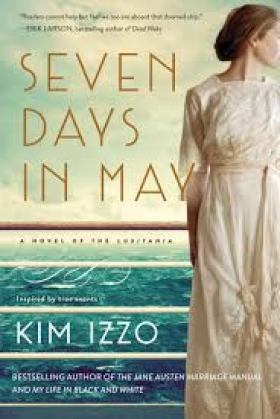Week 2 of Nonfiction November is a real highlight for me every year. This week is hosted by the brilliant Sarah @ Sarah’s Bookshelves (seriously, have you listened to her podcast? So many great books all the time!) and is really a great way for people who don’t think they like nonfiction to get introduced to some great books. For the nonfiction/fiction book pairings:
It can be a “If you loved this book, read this!” or just two titles that you think would go well together. Maybe it’s a historical novel and you’d like to get the real history by reading a nonfiction version of the story.
Without further ado, here are mine!
Kick Kennedy
I first read about Kathleen ‘Kick’ Kennedy when I read Laurence Leamer’s The Kennedy Women. But as she died when she was 28, there wasn’t a whole lot of time devoted to her or her story. Which is bananas because her life was…well, when I finally read her biography, I was sobbing.
The Kennedy Debutante by Kerri Maher. This book looks at a very specific time in Kick’s life. We meet Kick in 1938 on the day she debuts in London Society, as the daughter of the American Ambassador to England. The book follows an incredibly popular Kick at all the parties and the estate weekends she is invited to. And then she meets Billy Hartington, the son and heir of the Protestant Duke of Devonshire. As they fall in love, they must grapple with the issues of faith that would keep them apart – Kick is very serious about her Catholic faith and would have to give that up were she to become the Duchess of Devonshire. This book doesn’t follow Kick to the end of her life and when I finished it, I immediately ordered a biography of the extraordinary women at the heart of this book.
Kick: The True Story of JFK’s Sister and the Heir of Chatsworth by Paula Byrne. This book was exactly what I hoped it would be. The author was also introduced to Kick by way of Laurence Leamer’s book and tried to find out more about a woman who had kind of been erased from the Kennedy myth because of the circumstances surrounding her death. I don’t want to say anymore really (not that you can’t google it) because I really want you to read this book. Kick seemed like the most wonderful person, everyone who knew her loved her. Her brother Jack never spoke of her after her death, it was too painful. And little brother Bobby named his first child Kathleen but on the condition that she never be called Kick. It’s not a big biography, it reads like a novel about a romantic, rebel intent on following her heart.
WWII Paris
OK so WWII can be one of those genres that people get fatigued by very easily. I’m one of those people who kind of steers clear of these books as they all start to run together after a while. But when I read these two books this year, I knew I had to include them in this post.
Mademoiselle Chanel by CW Gortner. I’ve always found Coco Chanel to be somewhat enigmatic, someone who wasn’t super keen to be well known, to want to live her life in the background. Mademoiselle Chanel was the first time I felt like I read something where I got to know the woman behind the legend. While this book doesn’t focus just on what Chanel was doing during WWII, when I finished it, that was the part that really stuck out for me. Even though it was a fictionalized account of her life, I thought Gortner did an incredible job at getting to the real person, warts and all.
Les Parisiennes: How the Women of Paris Lived, Loved, and Died Under Nazi Occupation by Anne Sebba. I mean, this title kind of says it all no? In some respects, it reminded me of A Train in Winter in that it covers the lives and deaths of a great number of women. But while that book focused on the lives of those women who had been involved in the Resistance, Les Parisiennes looks at those women plus the society women who maybe colluded with the Nazis to continue living their fairly comfortable lives. For a lot of people, Nazi occupation didn’t really change their way of life and that’s something people don’t like to think about outside of Germany.
The Lusitania
I’m not normally one for nautical reading but stories about the Lusitania have such a human element. It was one of the reasons American involvement in the Great War was justified two years later.
Seven Days in May by Kim Izzo. Sydney and Brooke Sinclair are New York heiresses set to sail for England. While Sydney is heavily involved in suffrage and women’s causes (the novel opens with her visiting a clinic that helps women who have had illegal abortions), Brooke is engaged to an impoverished English peer. They have no idea that the Lusitania has been targeted by German U-boats when they board for their crossing. Isabel Nelson does have an idea about the fate of the Lusitania. Back in London, Isabel works in a coding unit for the British Admiralty. Her work with codes and cyphers means she is privy to secrets around the true cost of the war. The novel follows all of them over the course of the seven days in May that will change the trajectory of history. Izzo does an incredible job recreating the atmosphere on board the ship and the eventual sinking, peppering the novel with real life stories of those who were on board. If memory serves, I believe she has a family connection to someone that was actually on the ship.
Dead Wake: The Last Crossing of the Lusitania by Erik Larson. Here is my annual plea for people to read books by Erik Larson: Guys. If you have not read anything by Erik Larson, you need to. Dead Wake covers the last crossing of the Lusitania in heart breaking detail. Larson has put together a timeline down to the minute. I read this a while ago but I remember that I read the whole thing in one day. I could not put it down. It doesn’t read like nonfiction (Larson’s work never does) and I couldn’t believe that what I was reading actually happened. I spent a long time after finishing this book googling the things he wrote about.
So those are mine. Which book recently sent you on a quest for more information?







